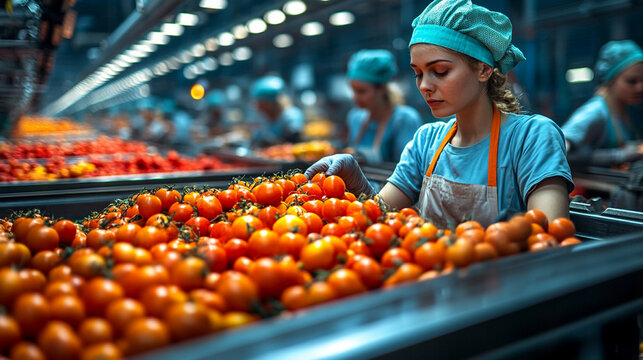Jakarta, Indonesia Sentinel — In an increasingly interconnected world, international food standards play a crucial role in ensuring the safety, quality, and consistency of food products across global markets. These standards are designed to protect consumers from foodborne illnesses, ensure fair practices in food trade, and maintain the integrity of food products. This article explores the importance of the standards, key organizations involved, and how these regulations shape the global food industry.
What Are International Food Standards?

International food standards are guidelines or regulations established to ensure the safety, quality, and integrity of food products, regardless of where they are produced or consumed. These standards provide a framework for food producers, manufacturers, and regulators to work within, ensuring that food is safe for consumption and meets certain quality benchmarks.
The need for international food has grown with the rise of global trade, as food products are increasingly exchanged across borders. These standards help to minimize risks associated with food safety, such as contamination, adulteration, or improper labeling, and they promote consumer confidence in the food supply.
Key Organizations Involved in Setting
Several international organizations are responsible for developing, promoting, and enforcing food standards globally. These organizations work together to create frameworks that ensure consistency and safety across different countries and markets.
- Codex Alimentarius Commission (Codex): Established by the Food and Agriculture Organization (FAO) and the World Health Organization (WHO) in 1963, Codex is the most widely recognized international body responsible for setting food standards. Codex develops guidelines, codes of practice, and standards for food safety, quality, and labeling, covering everything from pesticide residues to food additives. Codex standards are used by countries as the basis for their own national regulations and are particularly important in international trade, as they help prevent barriers to trade due to differing national food safety standards.
- World Trade Organization (WTO): While not directly responsible for food standards, the WTO plays a key role in overseeing international trade agreements and resolving disputes related to food safety. The WTO’s Agreement on Sanitary and Phytosanitary Measures (SPS Agreement) sets out rules for the protection of human, animal, and plant life or health through food safety measures, requiring that such measures be based on scientific evidence and international standards.
- International Organization for Standardization (ISO): ISO is a non-governmental international organization that develops and publishes standards for various sectors, including food safety. ISO standards for food safety management systems, such as ISO 22000, provide frameworks for ensuring the safety of food products from farm to table.
Why Are International Food Standards Important?
- Consumer Protection: The primary goal of international food standards is to protect consumers from potential hazards associated with food. This includes preventing contamination from harmful bacteria, chemicals, or allergens. Standards also ensure that food products are properly labeled, so consumers can make informed choices.
- Facilitating International Trade: With food being traded across borders more than ever, international food standards help to reduce barriers to trade. Harmonizing food safety standards ensures that food products from different countries meet the same safety and quality requirements, allowing for smoother trade and preventing conflicts between nations.
- Promoting Fair Practices: International standards help level the playing field for food producers by providing clear guidelines for production, labeling, and safety. This promotes fairness in the market, ensuring that all food producers, regardless of their location, follow the same basic rules.
- Preventing Foodborne Illnesses: Foodborne illnesses are a significant public health issue worldwide. According to the World Health Organization, unsafe food is linked to more than 200 diseases, ranging from diarrhea to cancers. International food are essential for minimizing the risks of foodborne diseases by ensuring that food is produced, handled, and stored in safe conditions.
- Supporting Sustainable Practices: Many international food include provisions for sustainability, encouraging practices that protect the environment, conserve resources, and promote animal welfare. These standards are increasingly important as consumers demand more ethically produced food and as the global food system seeks to address environmental challenges.
Examples of International Food Standards
- Food Safety Standards: Codex sets guidelines for food safety, including limits for pesticide residues, acceptable levels of contaminants like heavy metals, and microbiological safety standards for different types of food.
- Labeling Standards: Codex also provides guidelines on food labeling, ensuring that labels are accurate, truthful, and informative. This includes nutritional labeling, ingredient listing, and allergen warnings.
- Food Additives and Preservatives: Codex and ISO standards establish safe limits for the use of food additives and preservatives, ensuring that they are used safely without posing a risk to consumers’ health.
- GMO Standards: As genetically modified organisms (GMOs) become more prevalent in the global food supply, international standards, such as those set by Codex, regulate the safety of GMOs and their labeling to ensure consumer awareness.
Challenges in Enforcing International Food Standards
While international food play a vital role in safeguarding food safety and quality, challenges remain in their implementation. Some of these challenges include:
- Differences in National Regulations: Despite international standards, countries may still have different regulations or interpretations of food safety guidelines. This can lead to inconsistencies in how food safety is ensured across borders.
- Lack of Resources in Developing Countries: Many developing countries may struggle to implement food standards due to limited resources, lack of infrastructure, or insufficient training for food safety personnel.
- Emerging Food Safety Risks: The global food system is constantly evolving, with new risks emerging, such as antimicrobial resistance or foodborne pathogens that evolve quickly. International food must adapt rapidly to address these new challenges.
Suku Mante, Mysterious Tribe Living in the Vast Forests of Aceh
Conclusion
Food standards are essential to ensuring the safety, quality, and fairness of the global food supply. By setting guidelines for food safety, labeling, trade, and sustainability, organizations like Codex Alimentarius and ISO help protect consumers, facilitate international trade, and promote ethical practices in the food industry. As the global food system continues to evolve, these standards will remain crucial in safeguarding public health and ensu
(Becky)
























